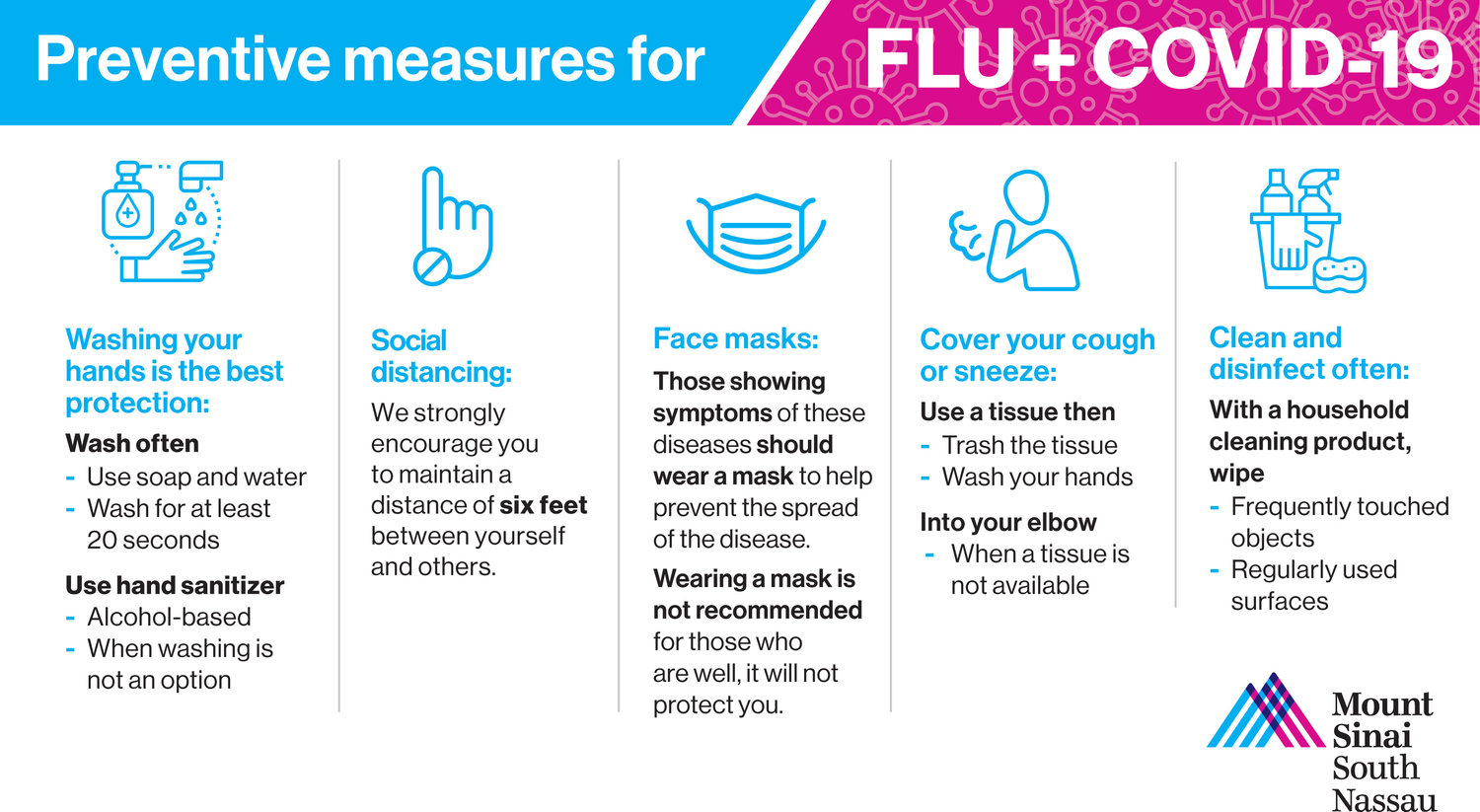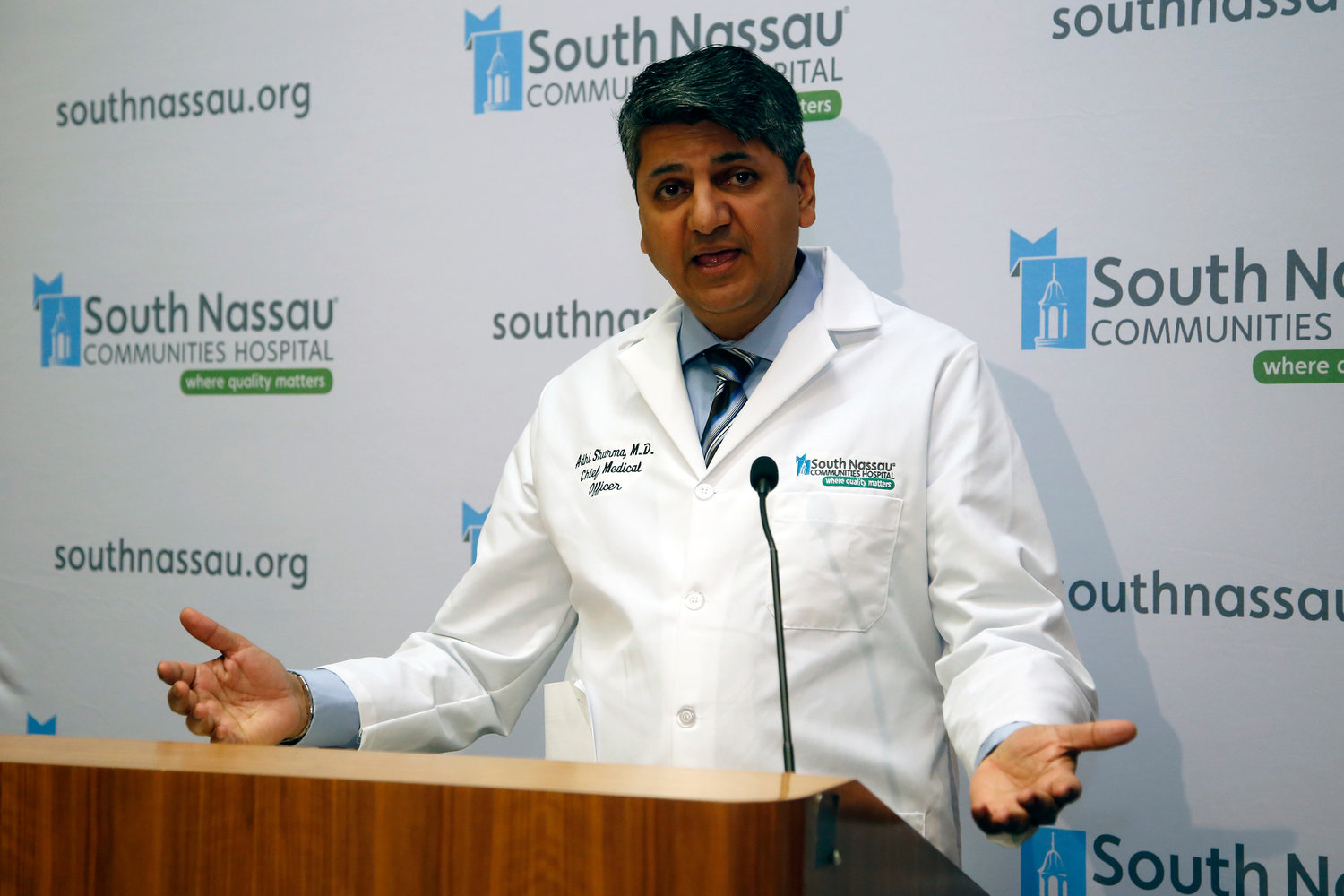Doctors, health experts focus on the physical, mental toll of the coronavirus

Health officials continue to place a strong emphasis on the physical and mental wellbeing of the community as coronavirus cases continue to soar across Nassau County, leading to fear and a lot of unanswered questions.
On Wednesday, county officials announced there were more than 3,000 cases in the Nassau. Overall, there were been 19 coronavirus-related deaths in the county as of Thursday afternoon.
Flattening the curve’
Dr. Adhi Sharma, the medical director for Mount Sinai South Nassau hospital in Oceanside, described the influx of patients to the facility as “nonstop,” but said the community can do its part to help keep coronavirus cases down by heeding the warnings of health professionals.
“I can’t stress how important social distancing is,” Sharma said. “We have two full units full of sick people, so it’s not overblown. This is an extreme situation.”
Sharma said it was against policy to comment on the number of cases the hospital has and how many people are being tested. He did note, however, that physicians are keeping patients who are suspected of having the virus or confirmed to have it in a different environment than others.
According to Sharma, people practicing social distancing and frequently washing their hands is the best way to flatten the curve of cases and could help against health officials’ forecast that the peak of the illness in the U.S. may be more than a month away. He added that people can contract the illness and start spreading it instantly despite not feeling symptoms for as long as five to six days. While the majority of patients who die from the virus tend to be senior citizens, Sharma noted, it does not mean that younger people are immune.
“If people think their age is going to protect them, they may be in for a horrible surprise if they contract the virus,” he said.
Sharma said that anyone who feels mildly ill should self-isolate rather than go to hospitals or doctor’s offices, which are inundated with sick people because of the virus and it being flu season. He added that if a person exhibits symptoms and feels that they should get tested because there is an at-risk person at home, they should call ahead and make an appointment.
Doctors do not recommend retesting after a person is diagnosed with coronavirus because they want to conserve tests. Sharma said the wait time for results has improved because the hospital was initially sending tests out to a lab in North Carolina, but now sends one to a high-volume lab in New Jersey, and may soon be able to send tests to Mount Sinai in Manhattan, which could make results available daily.
Sharma added that he was proud to see the staff at MSSN step up during a time of crisis. “It’s been an amazing thing to see how people are banding together, working together and putting themselves in the line of fire,” he said, “and the dedication and commitment is really heartwarming.”
The mental toll
Anthony Santella worked in downtown Manhattan during the terrorist attacks of Sept. 11, 2001, and was a student at Tulane University in New Orleans at the height of Hurricane Sandy. Now an associate professor of public health at Hofstra University, he said he plans to use those experiences to help others cope.
“While I don’t have any formal education in emergency preparedness and response,” he said, “it has guided the work that I do and the response I have to man-made or natural disasters.”
Santella is using his training in public health and infectious diseases to help younger people understand the pandemic. He developed two free webinars, one for children and teens in elementary and middle school on Tuesdays at 6 p.m. and Saturdays at 4 p.m., and the other for high school students on Thursdays and Sundays at 7:30 p.m. The webinars, which Santella is conducing alongside his two nieces, who are 12 and 10 respectively, will feature a half hour information session about what the coronavirus is, followed by a question and answer session. Those looking to register can do so at anthonyjsantella.com.
William Sanderson, a professor of psychology at Hofstra and the director of its anxiety and depression clinic for two decades, said he is taking a three-pronged approach to helping his students.
Sanderson said he is telling them to keep the risk in perspective and realize that not everyone who contracts the virus will die, to limit their media and social media intake significantly while sticking to a few sources for information so that it is not overwhelming, and to keep a normal routine as much as they can. To practice social distancing, Sanderson communicates with students and colleagues via Zoom video chat, and has fostered a positive message for them.
“This will change and this will go away,” he said of the virus. “It will certainly leave a lasting impact like 9/11 did and like Hurricane Sandy did. It may even be more profound than either of those two, but engaging in activities and looking toward the future will be helpful.”
Psychologist Dr. Paul Engel, of Oceanside, said he is now treating patients over the phone or via video chat and noted that while there have been some adjustments, most have found it helpful to continue to be able to speak with him.
Engel is part of Queens Long Island Community Services, a counseling program under the umbrella of the Flushing Jewish Community Counsel. He speaks with clients from temples and churches in Nassau and Queens, including the Oceanside Lutheran Church and the First United Methodist Church in Oceanside.
Engel said he has witnessed a range of reactions to the virus, and has noticed that a large number of people are depressed and agitated. He said fear over the virus, a loss of income due to work closings and anxiety among those who are not used to being homebound have been the most common issues he has seen. He added that he tries to keep the video and phone conversations at the routine time he met with patients in-person before the outbreak.
“I stress the idea of doing some sort of exercise, maintaining a good diet and getting rest,” he said. “Those things are essential and also what’s important is to reach out and interact with people, if not in person, then through the various technological ways you can.”
Banding together
Though businesses are being hurt by Gov. Andrew Cuomo’s ruling that they can only offer takeout, it did not stop Bonbino’s Pizza, on Lawson Boulevard in Oceanside, from delivering free food to the staff at MSSN on March 18.
“They did so unsolicited,” said Joe Calderone, the hospital’s senior vice president of communications. “I think that the community is seeing that the health care workers here are on the front line of this crisis.”
Calderone said he was grateful to the pizza shop and to his staff for rising to the occasion during a crisis. Two weeks ago, a crew of workers moved the hospital’s oncology infusion center to conference areas on the first floor so that the existing space could be used to house coronavirus patients. Another conference area was also converted to a sleeping area for the staff.
“This has been an all hands on deck situation and every staff member knows that this is a crisis that we really haven’t seen in our lifetime before,” he said.
Sharma said the community needs to stick together, and that if people wash their hands and practice social distancing, things can return to normal soon.
“Times of crisis are times when Americans do their best,” he said. “They band together and show the strength that they have as a community. We’ll get through this like we have every other crisis, and we’ll find the bright light on the other side, hopefully in a few weeks. If people take this seriously and do the right thing, we can flatten the curve.”






